Into the Real With Hannah Einbinder
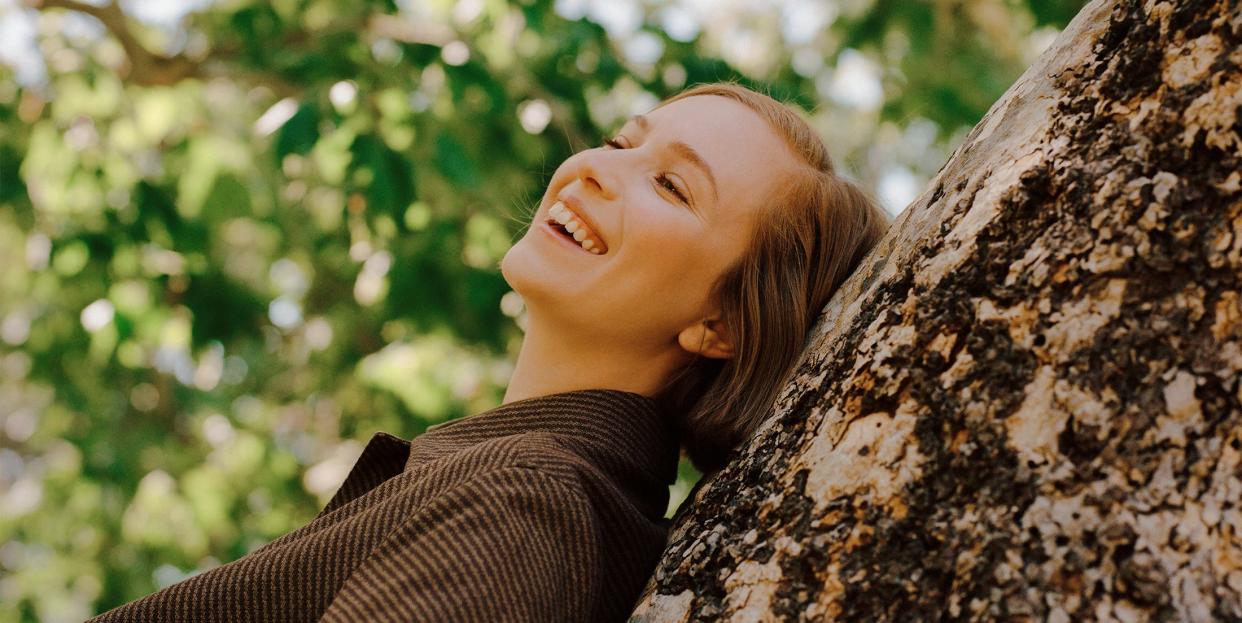
- Oops!Something went wrong.Please try again later.
- Oops!Something went wrong.Please try again later.
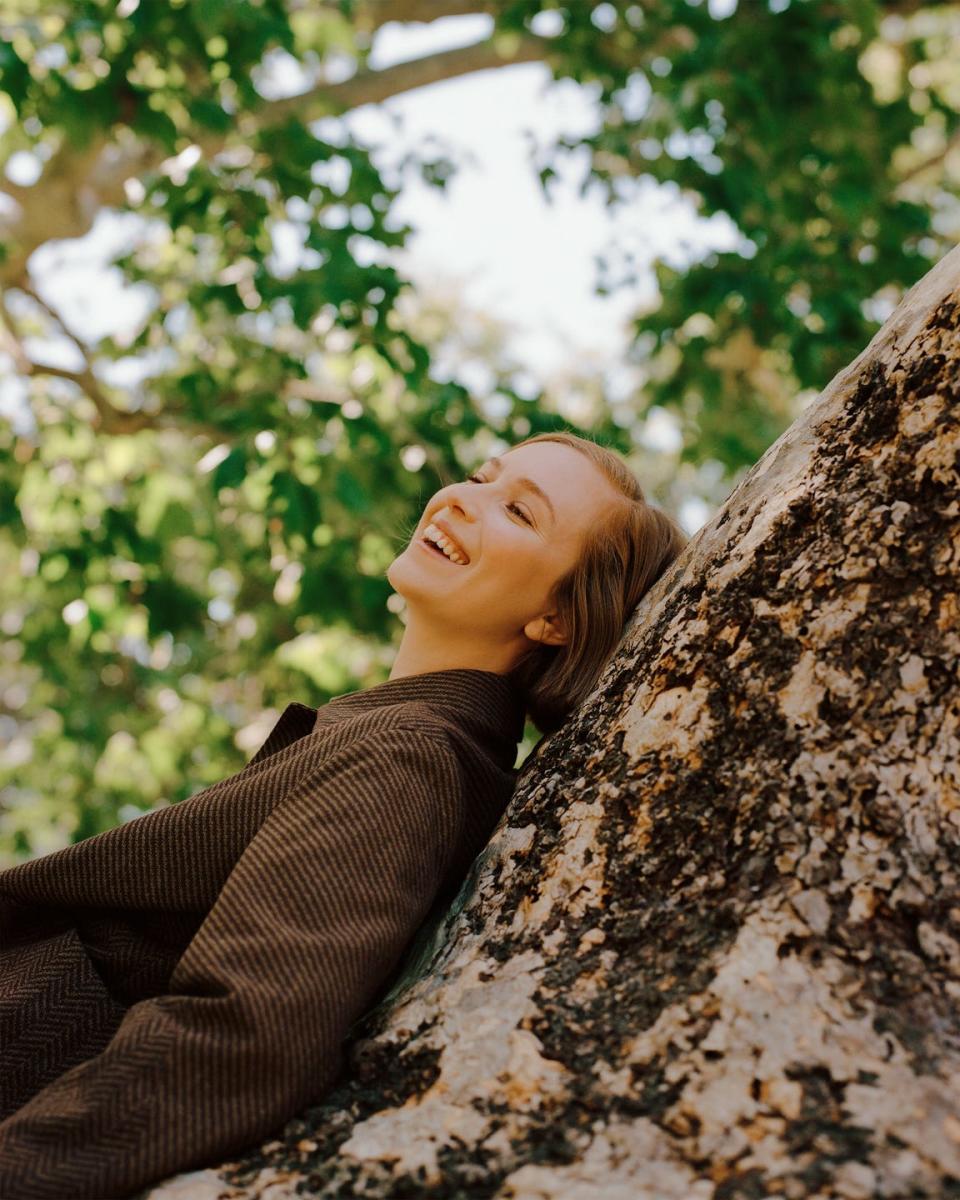
It’s a few days before the premiere of the second season of Hacks on HBO Max, and Hannah Einbinder, one of the show’s two stars, is at home in the Silver Lake neighborhood of Los Angeles trying not to panic. A self-described “self-critical and somewhat self-involved performer,” she recalls believing before the first season dropped last year that the audience was definitely going to despise her. And despite the fact that the opposite happened–she was nominated for an Emmy, among other accolades–she is once again bracing herself for the haters. “It’s just this never-ending loop of what I now understand is a delusional sort of hyper-critical thinking,” she says over Zoom with her camera off because, she explains, she has just returned from getting a facial. “I’m looking pretty psycho right now and I don’t want to subject you to that, Rachel,” she tells me in her flattest, most deadpan voice.
On Hacks, Einbinder, 26, plays Ava Daniels, a chronically oversharing, bisexual Gen Z comedy writer whose once-promising television career got derailed by an offensive tweet. (In other words, she was “canceled.”) Desperate for work, Ava takes the only job she can get: writing jokes for an older, Las Vegas stand-up comedian named Deborah Vance, played by legendary actress Jean Smart, 70, known for roles in shows ranging from Designing Women to Frasier, and more recently, Mare of Easttown, which ran on HBO at the same time as Hacks and also earned her one of two Emmy nominations that season. The show is set up like a platonic rom-com, with the tension and tenderness between this unlikely intergenerational duo propelling the narrative forward. On a more meta level, seeing the iconic Smart pretending to be a stand-up comedian opposite Einbinder, a real-life stand-up comedian in her first acting role, makes Hacks fascinating to watch. Smart remembers that when she arrived on set to start filming, “I thought to myself, ‘Oh God, this girl does stand-up professionally! What is she going to think when I’m up there doing my routines?’” (It all worked out: Smart was so believable that she won an Emmy for her performance.)
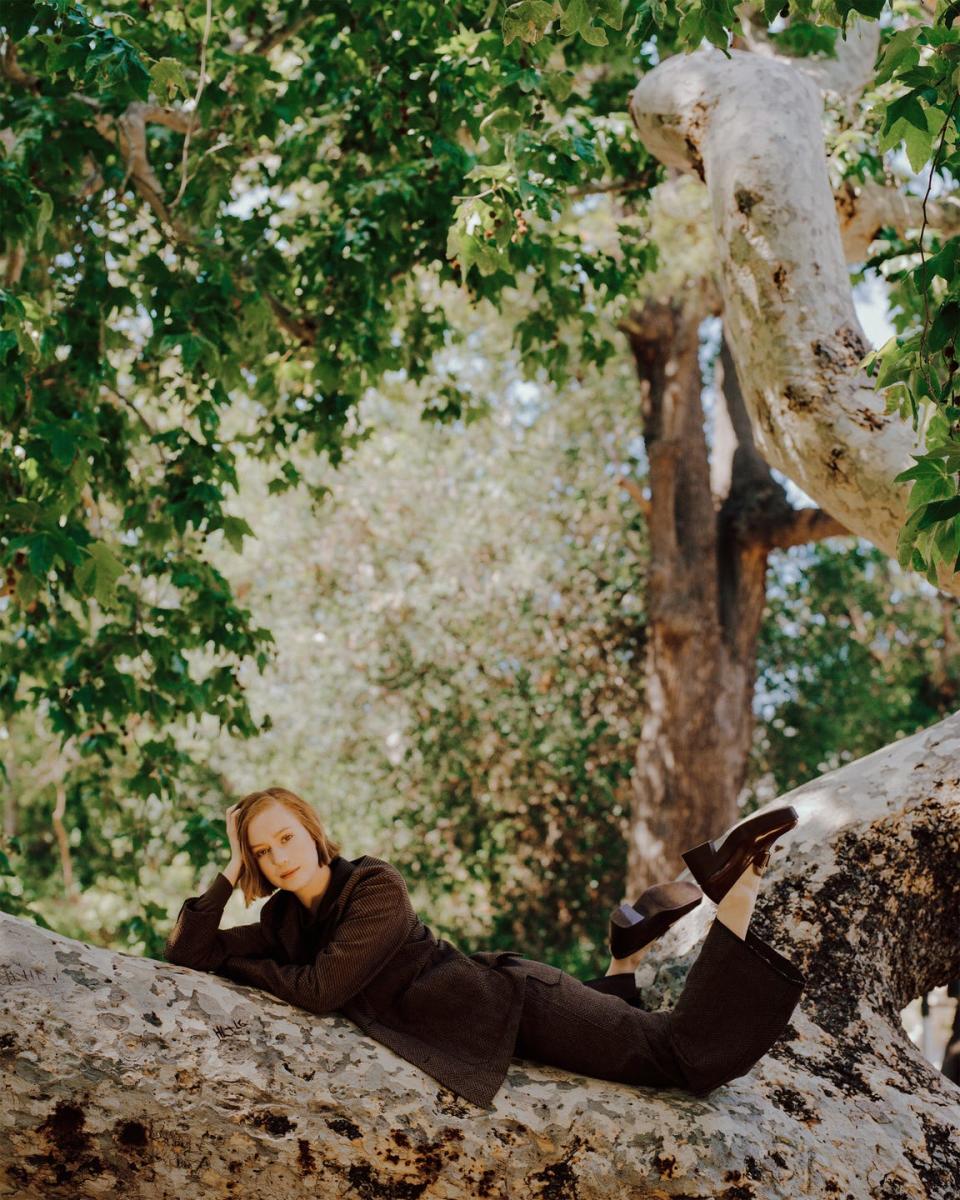
The show’s first season, due to Covid restrictions and the nature of the plot, was set in Las Vegas but filmed largely in Los Angeles. Shot in a post-vaccine world, Season Two, which premiered on May 12, feels more expansive, featuring a wild road-trip with Thelma & Louise vibes, a broader range of locations, and a bigger cast of supporting characters, such as “Weed,” a militant road manager played by Laurie Metcalf. Over the course of the season, Deborah and Ava work out new material, grappling with their complicated relationship while barreling cross-country on a tricked-out tour bus. It all feels like a rare peek behind the curtain into the realities of touring as a stand-up comedian. Being on the road “is such a specific experience and [the writers] did such a good job nailing it,” Einbinder says.
Growing up in the entertainment industry–her mother, Laraine Newman, was an original Saturday Night Live cast member and her father, Chad Einbinder, is an actor and comedy writer–Einbinder always thought she would wind up doing something else with her life. “There’s a bit of a contrarian in me,” she says, adding that she knew all about the psychological toll that show business took on her parents, who met in Alcoholics Anonymous. In Newman’s recent memoir, entitled May You Live in Interesting Times, she describes her struggles with drug addiction and an eating disorder, and says the quotidian experience of carpooling her kids to after-school activities was “a merit badge of normalcy,” following a life spent “being a drug addict–and even worse, an actress–two things that, let’s face it, society looks down upon.”
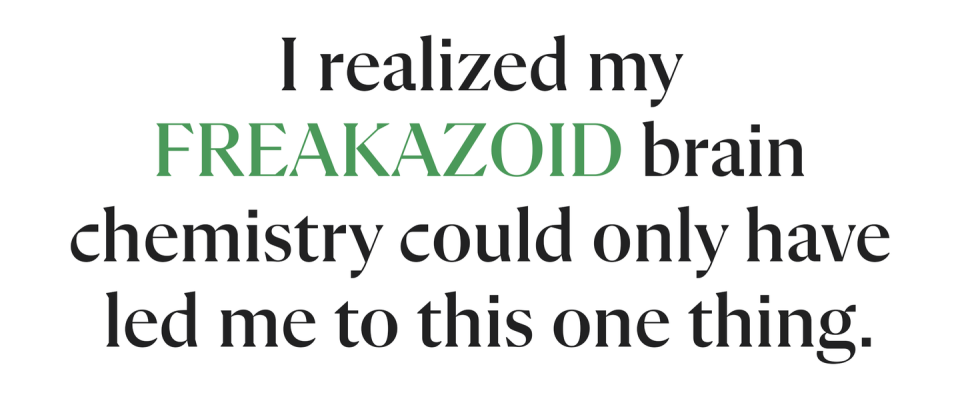
As a kid, Einbinder was diagnosed with ADHD and got into competitive cheerleading as an outlet for her energy. (“I spawned the rarest of flowers: the Jewish cheerleader,” Newman says in her memoir.) In high school, Einbinder says she was an Adderall-fueled stoner with no real direction, simply focused on “trying to survive socially.” She became obsessed with the news, reading the New York Times cover-to-cover every morning and watching MSNBC at night. In college at Chapman University she studied broadcast journalism because “I thought I wanted to be a political news anchor,” she says, waiting a beat for the punchline. “Then I realized that I just had a crush on Rachel Maddow.” (Then, another punchline: “I shouldn’t have said ‘had,’ past tense because it’s still happening, the crush.”)
During her senior year, while working on a student film set, Einbinder struck up a conversation with another student who happened to be the president of the Chapman improv team. Noticing Einbinder was funny, the classmate urged her to try out. She did. In doing comedy, everything came into focus. “I realized my freakazoid brain chemistry could only have led me to this one thing,” she says. After graduating in 2017, she told her parents that she wanted to pursue stand-up comedy as a career. They were supportive yet also somewhat concerned. “They were like, ‘Good luck! See you on the other side,’” she recalls. “They know it’s like this ruthless industry that ruins more lives than it doesn’t.”
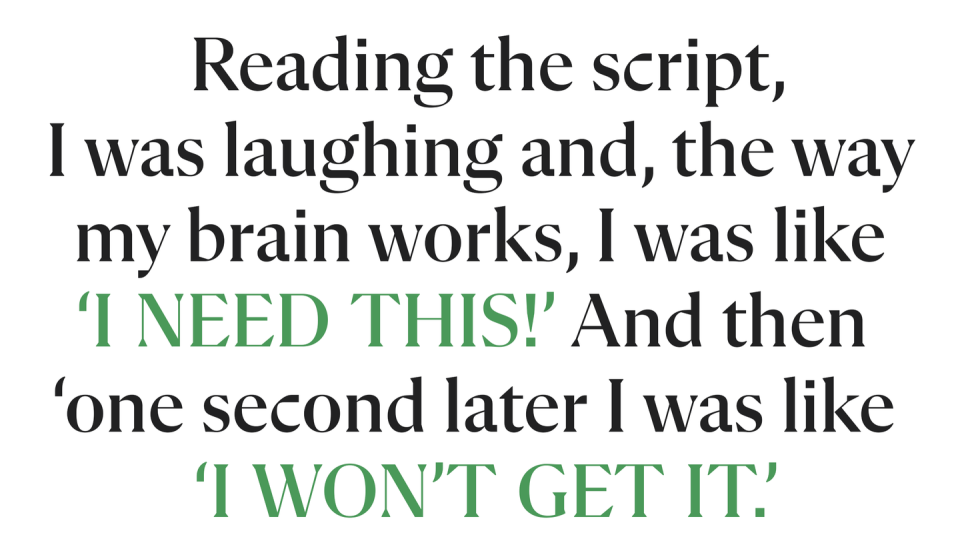
While working a day job at Alfred Tea Room in West Hollywood, Einbinder began developing her act, hitting comedy clubs at night where she mostly mocked her own neuroses. A couple of years later, once her routine felt more solid, she began auditioning for television roles. Nothing materialized. “I kind of just thought, ‘I guess I’m not a good actor,’” she says. Yet, on the comedy scene, things began taking off. After performing at a tiny underground club in 2019, she was approached by a booker for The Late Show With Stephen Colbert who invited her to record a segment. When it eventually aired, months later, Colbert introduced Einbinder as “a stand-up comedian making her network television debut.” For someone so consumed with self-doubt and so young–at the time, she was the youngest comedian to have ever performed on the show–she appeared astonishingly composed, her movements slow and deliberate, delivering her monologue in the off-kilter style of a beat poet. After revealing to the audience that she’s bisexual but prefers to date women, she compared men to Las Vegas. “I show up. I lose everything that I came with. I vow never to return again. And then six months later, I’m like ‘Let’s go to Vegas.’”
Six months after recording the segment, right around the time it aired, Einbinder found herself in a Vegas state of mind for different reasons: reading the “sides”–industry-speak referring to segment of the script given to actors for auditions–for Hacks. She remembers being totally bowled over by the writing. After more than a year of auditions for roles on various television shows, “I don’t even know how to describe how giant and colossal the difference was from anything I’d read before,” she says. For one thing, she had never auditioned for a character who was genuinely funny. “Reading the script, I was laughing and, the way my brain works, I was like ‘I need this!’ And then one second later I was like ‘I won’t get it.’”
That sense of resignation, the internal loop telling Einbinder that there was no way she would ever be landing this role, wound up freeing her to let loose in her first audition. Reading lines for the scene in which Ava and Deborah first meet at Deborah’s ridiculously opulent Las Vegas mansion, Einbinder decided to improvise, ad libbing a line about how she “flew all the way here on Spirit fuckin’ airlines,” which wound up in the final shooting script. The three show-runners, Lucia Aniello, Paul W. Downs and Jen Statsky, called her afterward to tell her they loved her audition, and urged her to do more improvising when they met again.
By then, the writers had auditioned hundreds of young women–mostly professional actresses, though they were hoping to cast a comedian. “Hannah just brought something that felt so real,” says Aniello. “We wrote a very specific character: a bisexual writer who says the wrong thing at the wrong moment but is raw and honest, and there’s something about Hannah that is just so authentic that you believe every part of her.”
Just days after that first audition, the coronavirus hit the U.S., and Einbinder found her life becoming even more similar to Ava’s. Stand-up comedy completely disappeared. The Hacks writers put casting on hold while they wrote the rest of the season’s episodes. With Los Angeles under lockdown, “the only thing I had to interact with comedically was this audition,” she recalls. For the three months between the audition and the first callback–conducted via Zoom due to Covid restrictions–“I was just like thinking about it, and reading it and rereading it.”
Ultimately, Einbinder was one of three potential Avas–the other two were both professional actresses–who were invited to come in for a screen test with Smart. Einbinder was excited about the opportunity to perform live in front of a group of people, which she hadn’t been able to do in months, but also anxious to meet Smart. The night before the screen test, Smart called her to ease her nerves. “I wanted her to feel comfortable because I know what it’s like to be in that situation,” says Smart, who had watched some of Einbinder’s comedy beforehand and found it to be “unique and funny.” When Einbinder arrived on the Paramount soundstage, the scene–complete darkness save for two blinding spotlights on two chairs separated by a plexiglass divider–was so “hyperbolically terrifying,” Einbinder says, that she joked to the show-runners that she finally understood what was going on here: it was all “just a ruse” so they could murder her.
But once Einbinder and Smart took their seats and started reading for their roles she could feel the familiar energy of a dark nightclub, the life-affirming sounds of the show-runners’ laughter in the audience. “It was the longest I had gone without performing since I started doing stand-up,” says Einbinder, who left the screen test feeling “euphoric” and, for the first time, open to the possibility that perhaps she would get this role, “and if not, that was fucking awesome.” Smart told the producers that as far as she was concerned, Einbinder was her top pick. “People say this a lot, but you can’t fake chemistry, and [Einbinder and Smart] have it,” says Aniello. “They had it from the first moment they started reading the scene across from each other and they still have it.”

The first season of Hacks was a top performer for HBO Max—consistently ranking in the top ten most viewed titles out of all available content—as well as a critical sensation, garnering 15 Emmy nominations and winning three. Critics noted Einbinder’s ability to go toe-to-toe with Smart and praised her raw, emotional performance. Although she didn’t win the Emmy in her category (Best Supporting Actress in a Comedy), when Smart won she thanked “the unbelievable cast, led by Hannah ‘Mindbender’ Einbinder,” as her costar’s eyes welled up with tears. When I bring up that moment, Einbinder’s voice cracks. “I get emotional easily for sure, but I mean, especially when it comes to Jean,” she says. “She’s one of the most important people to me.”
Their offscreen relationship was on full display in April, when Einbinder gave a speech at a ceremony to mark the unveiling of Smart’s star on the Hollywood Walk of Fame. “I love laughing with you. I love yelling at you. I love crying with you. Every day with you makes me better,” she told the crowd earnestly, before holding up a manila folder that said “Wedding Vows” and apologizing that she had accidentally delivered the wrong speech. Smart cracked up. “Making Jean laugh, that’s kind of my number one motive,” Einbinder says.
Now that Einbinder has been through a full season and an awards cycle, Aniello says “she naturally has more confidence, which has allowed her to be a little looser” in Season Two, ad-libbing lines that the writers thought were so funny they wound up in the final cut. Smart noticed that Einbinder was a bit more relaxed while shooting this time around, saying “I think she’s been perfect from the beginning, but a lot of people keep saying she’s getting better and better.”
Her off-duty fashion has also been getting better. Einbinder used to dress so much like her Hacks character that many of Ava’s looks–the Doc Martens, the flannel shirts, vintage Levi’s, gas station attendant jackets, etc.–were sourced from Einbinder’s closet. These days, she’s been having more fun with dressing up, working with celebrity stylist Kevin Ericson and honing a chic, menswear-inspired look. For the Independent Sprit Awards in March, she showed up in a colorful Paul Smith pantsuit paired with a custom-made bolo tie shaped like a Jewish star. (“I am the descendent of Jewish cattle ranchers. This one’s for my great grandfather, Harry Newman,” she wrote in an Instagram caption.) Rodarte, the Los Angeles-based design house, photographed her for their fall/winter 2022 collection in a pale blue ruffled dress, her arms positioned over her head like a ballerina. A vintage Givenchy pantsuit that she wore for a recent appearance on Jimmy Kimmel Live earned her a shoutout in a roundup of the best-dressed celebrities on Vogue.com. “Before this, I had always dressed the same way since high school,” she says. “But working with Kevin has opened a whole new world for me. It’s like this fun, wonderful little hobby that makes me feel more like myself.”
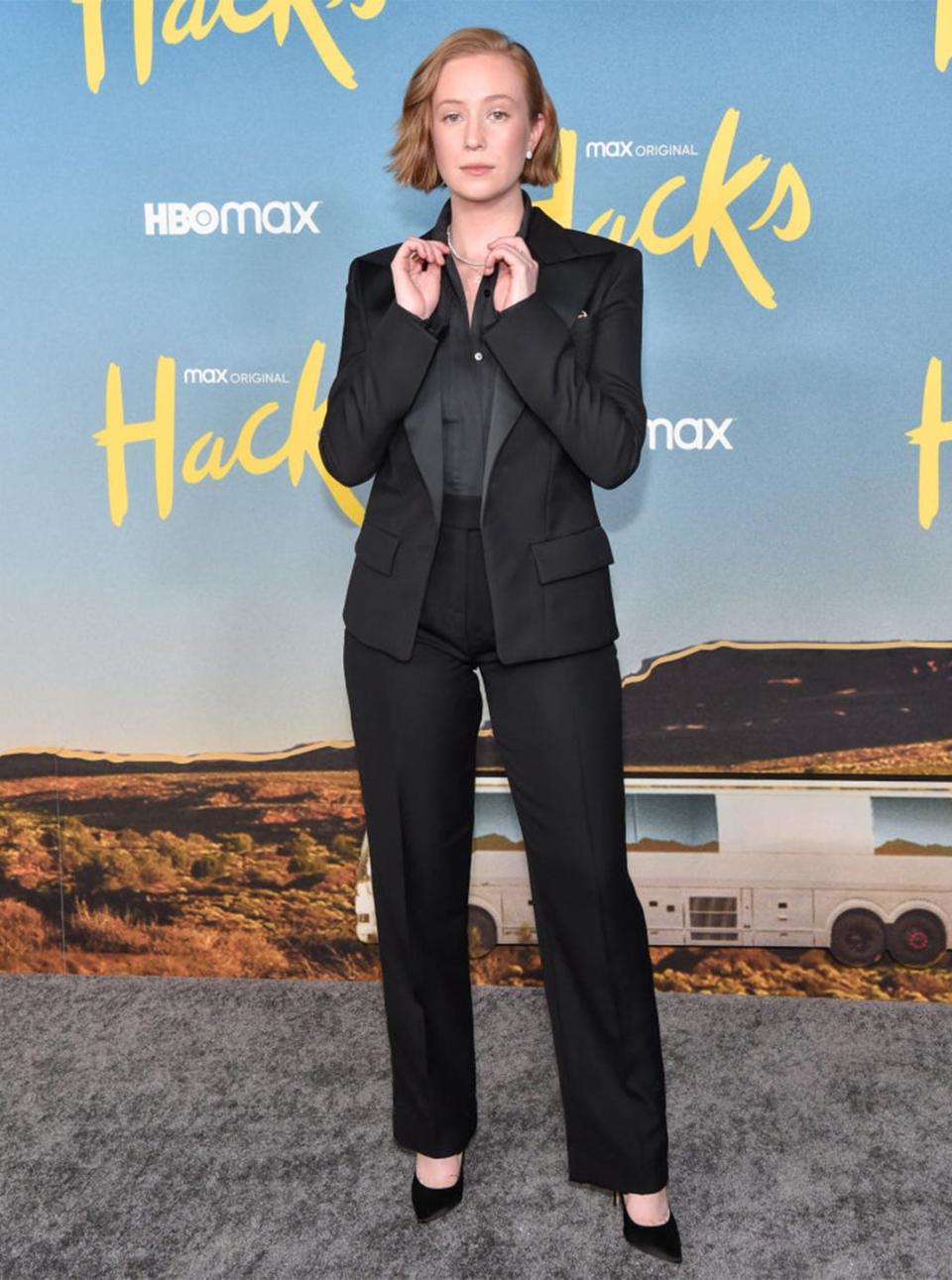
Now, as the adventures of Ava and Deborah unfold onscreen, Einbinder is getting ready to hit the road in real life, too. In June, she’s launching a multi-city comedy tour, culminating with a two-week run in London in September. By then, she’s hoping that her hourlong set will be tight enough to present to “the gatekeepers,” she says, for what will hopefully be her next big thing: a one-hour comedy special.
About ninety minutes had elapsed since Einbinder and I had started talking. I figured that whatever was going on with her face at the outset of our Zoom call had probably calmed down, if it was even so bad to begin with. “Can we please turn our cameras on?” I ask. And all of a sudden, there she is, her post-facial skin glowing. She’s wearing a red t-shirt that says “Brody” in a Coca-Cola font, which she explains is a tribute to Brody Stevens, a “comic’s comic’s comic” who struggled with mental health issues and died by suicide in 2019. “What a bummer I am,” she says.
Einbinder may be a real actress now, with a celebrity stylist, regular red carpet appearances and more ease with with life on set, but it occurs to me that her shirt is just more evidence that she is, at her core, a stand-up comedian. She’s part of a fellowship of people, who for a whole host of complex reasons, feel compelled to bare their souls in front of a room of strangers. When I tell her that I think doing stand-up can be heroic, she dismisses the idea outright. “It comes from, like, a sick desperation. Most people are not wired the way we are wired,” she says. “Stand-ups are just like, ‘We need this!’ We need this external validation because there’s nothing else like it.”
You Might Also Like

